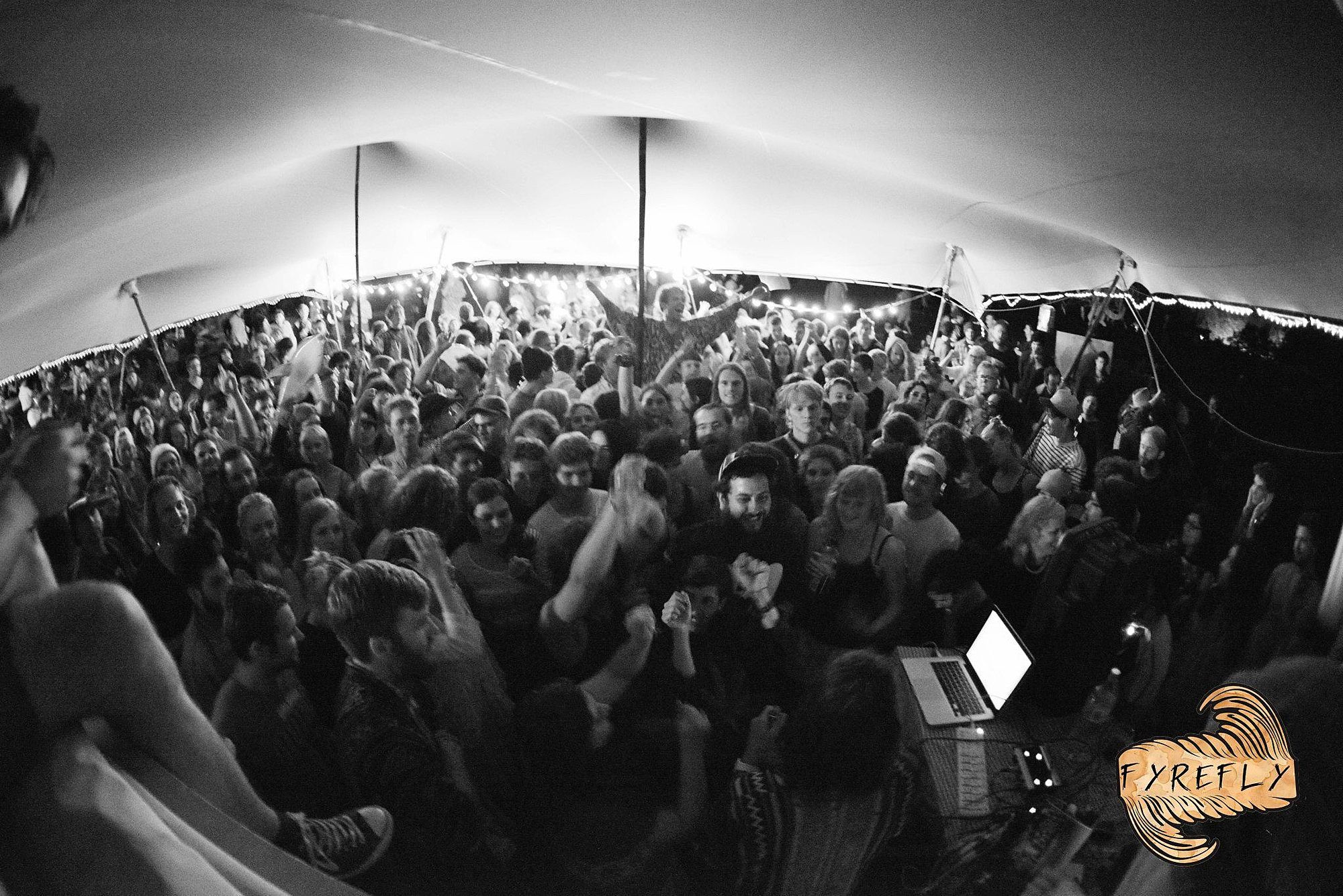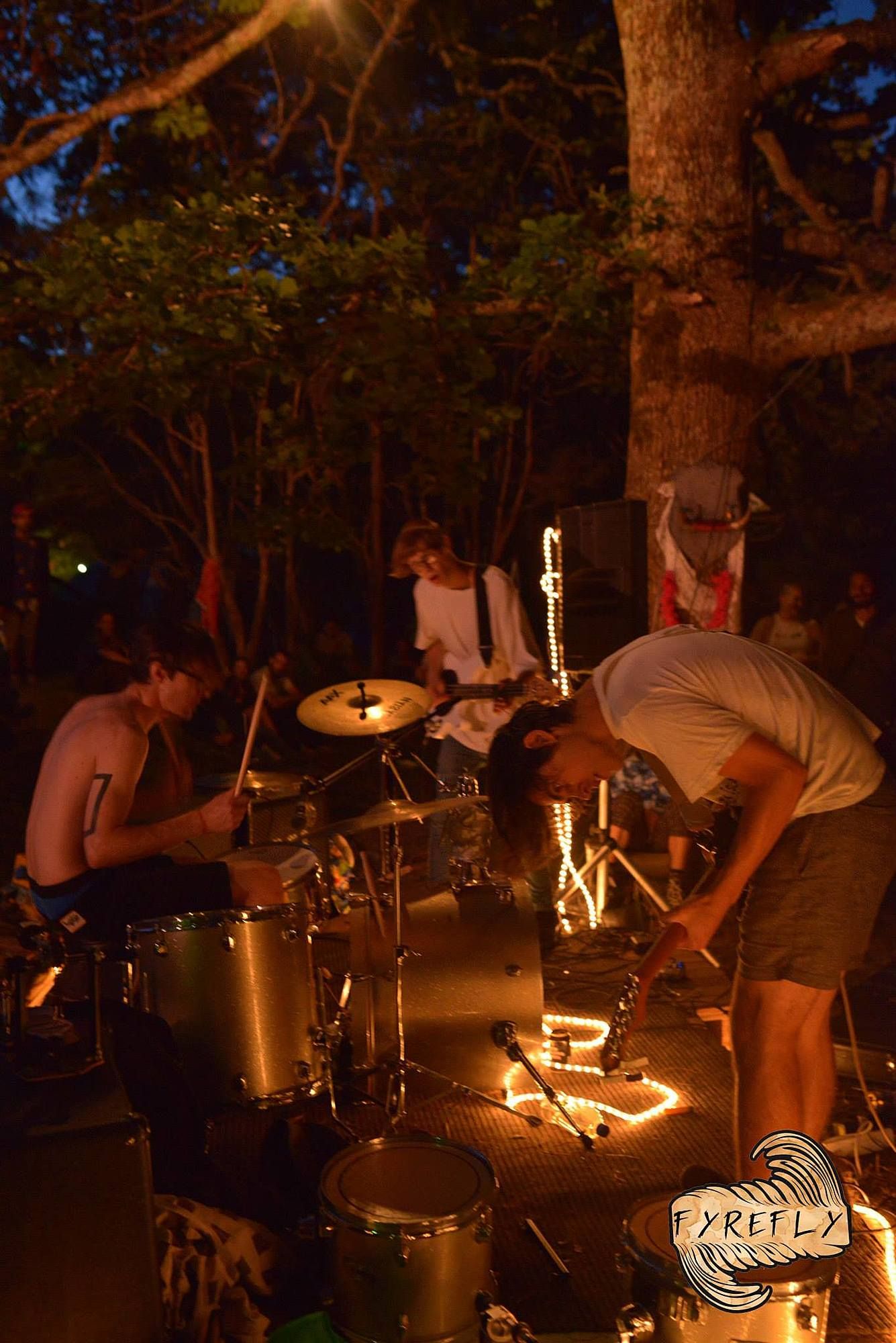Do It Together: Some Tardy Reflections on Chronophonium 2015
Dan Kelly on what might have been the last Chronophonium
“They shouldn't have held the event, they were told not to, [and] they could have avoided prosecution.”
- Thames Coromandel District Council
“Art is not a mirror held up to reality but a hammer with which to shape it.”
― Bertolt Brecht
On Wednesday the 24th of December at 11.03 AM the organisers of Chronophonium[1] received the following email from the Thames Coromandel District Council:
Dear XXXXX
Attached please find an abatement notice giving you notice that you must not undertake the holding of the Chronophonium Festival Event at 371 Tapu Coroglen Road Tapu on the 8th-11th January 2015, without first obtaining resource consent. As we are aware the resource consent has not been granted as at this date, the abatement notice takes effect immediately.
The consequence of ignoring this notice could lead to prosecution.
Yours sincerely
XXXXX XXXXXXXX
Music festivals in New Zealand and Australia have ended for less. A quick look at the annals of history – even the recent spate of NIMBY-driven relocations and cancellations this year – makes that obvious. What follows is an account of how the organisers responded, how the planned events played out, and – more philosophically – the significance that this came to have for me.
How to respond when the world tells you: you can’t? This essay offers one view – I leave it to each reader to decide where they sit.
From the Beginning:
A self-described “For-Fun-Not-For-Profit Do-It-Together Festival of Music + Arts”, Chronophonium has been running for four years, previously in Tangihua Forest near Whangarei, and more recently on a small plot of land at the eastern end of the Tapu-Coroglen Road in the Coromandel. In addition to their festivals, the organisers of Chronophonium run a number of events around Auckland throughout the year. Their approach is an open, collaborative one, remarkable for the quiet determination and persistence that it embodies. There is no corporate sensationalism or desperate marketing; theirs is a success that depends on the strong and engaged community that they have played a (considerable) part in building.
[Thursday 8 January: 10.56 AM]
It is the last morning before the festival starts, and there is still a lot to do. The organisers - some of whom have been living on-site (some since November) - are now complemented by a rapidly increasing number of volunteers and friends. Nearly everyone is busy being useful (or trying to be useful), and it feels good, or at least, it feels good to me. Gone are the leisurely swim breaks and expeditions in the ute; in their place we all stand patiently, waiting for instruction, helping where we can: putting the finishing touches on the main stage’s floor, assembling the secondary stage, setting up the recycling stations: a countless number of jobs, small and large.
Suddenly: disturbance – members of the Council have arrived, complete with police back up. Your correspondent stays clear of the actual discussion, but subsequent debriefings with the core organisers corroborate with the body language the rest of us see from afar. In sum, the Council’s representative is unhappy with the group’s plan to continue the festival, citing noise and safety as key reasons. Though Chronophonium has prepared responses to both, they don’t follow the Council’s rigid formula, and are consequently disregarded.
At this point, we should note that the successful completion of an Acoustic Assessment, upon which any resource consent of this type hinges, is priced at approximately $5,000, irrespective of the venture’s size. In the case of Chronophonium – which is explicitly non-commercial, charges only $60 for tickets and is BYO – it just isn’t feasible. As one observer noted, the resource consent process is not too dissimilar to that surrounding fire permits: you can do exactly the same thing, but the person who pays for the permit is allowed to have a fire, and the one that doesn’t, isn’t – which isn’t to say that regulation has no place, but merely to point out that its reduction to a capitalist checkbox is something that deserves consideration. Money talks, but are we happy about it? Should we have to pay to prove our competence?
Two very different worlds have clashed, so which should the reader side with? Let’s suspend judgment, and take a deeper look at the logic surrounding the abatement notice.
In the Council’s approach we see a base starting point of what can perhaps be termed mistrust: a presumption of incompetence on the part of applicants that can only be rebutted through stringent, inflexible adherence to bureaucracy. It’s an attitude that comes into stark conflict with the explicit ethos of Chronophonium, and it goes some way towards explaining the incompatibility of the two groups.
While largely self-explanatory, the philosophy of Do It Together can be seen as a direct response to the existing narratives of separation and self-interest that underlie our entire system. In choosing to frame our power as collective, D.I.T places the autonomy inherent in New Zealand’s proud history of D.I.Y (usually classed as a sort of rugged frontier individualism) within a community context – acknowledging our interdependence while simultaneously rejecting the divisions of hierarchy. Contrary to the popular understanding of anarchy as chaos, this approach actually internalises responsibility: our duty of care isn’t to some abstract entity, but to each other – a human scale.
The contrast between the Council’s model and the emergent responsibility showcased at Chronophonium offers moment for pause, and, for your correspondent at least, question: what does this model of humanity tell us about ourselves? Given the ubiquity of expectation bias – that is, the tendency we have to conform to what others expect of us - how does this framing affect how we act, indeed, the limits of how we can act?
In the absence of top-down control that Chronophonium’s structure established, we were forced to re-examine our initiative and autonomy. It felt strange at first – and yet, tasks slowly got ticked off, people picked projects and (for the most part) finished them. It wasn’t perfect, but it was illuminating. No one said learning to trust yourself would be easy.
[Friday 9 January: Due to reasons relating to certain frothy refreshments and my aversion to watches, I’m unsure of the exact time - perhaps before midnight?]
The festival receives their first visit from sound control. Their requests are complied with. From this point onwards the stages will get progressively quieter, to the point where I end up at Totems, expecting all the volume characteristic of his energetic bangers, only to find that I can hear the people in front talking.
Despite this, most attendees continue to party as if the music is still pumping: we Do It Together - it’s why we’re there. This is a key aspect of what makes Chronophonium so special: it’s not a mere transaction, where for money you are given some right to demand, but an invitation: what would you add? It’s worth noting that this inclusive atmosphere was reflected in the general courtesy displayed throughout the entire festival – not just of the Council’s wishes, but towards both artists and other festival-goers –in stark contrast to the vibe present at other, more commercial festivals.
There’s a satisfying synchronicity at play here. The reason that Chronophonium couldn’t afford their resource consent is tied directly to the culture of participation that's what I believe made the festival so transcendent. That is to say, it is only in the relative absence of money facilitated by Chronophonium that such a culture is possible.
Let’s go back to that last evening of preparation, my own fatigue pale in comparison to the stress and nerves the organisers must have felt: now exhausted from working almost non-stop, plenty of set up to go and the threat of shutdown – ie, failure – still looming very large.
Organic is an over-used term these days – but it is difficult to find another, equally suitable word for how it felt as the day disappeared and person after person stepped up to help. All our lives we’ve been told that we need money, that this impersonal, transferrable thing is crucial, that we can’t do anything without it. Nothing is free, the saying goes – but I felt no entitlement in those final full days of work, tiring and long as they were. It seems stupid, almost obvious – but isn’t that the point of friendship, of community?
In our learned rules – behind the pay for permit logic - is a culture of entitlement, and money plays a key part: I pay, therefore I deserve - and those who can’t don’t. So it is that money destroys culture: it takes an infinite game, requiring participation and engagement, and turns it into a finite, impersonal transaction.
And yet, that’s what most summer festivals are. In the absence of exorbitant fees, restrictive policing of alcohol or omnipresent security (and the threat of violence and suggested incompetence that they represent) is an opportunity to explore a different, more interpersonal world. Instead of entitlement, people accepted that they were there to participate; a scene was set, trust established and collaboration invited. From the stage where unbooked bands can play or the room set up entirely for painting to more spontaneous stuff - dancing in the daytime, swims in the river, even a friendly smile or hello - they all added to that atmosphere. Collaboration often gets cast as a fraught or difficult process – but this was every bit as fun as it sounds.
[Saturday 10 January: time unknown]
The room is screaming. Or rather, we are screaming: hoarse with song and damp with sweat. A projector throws giant words across the ceiling and we sing them together, dancing, laughing. Well and truly out for the count, I realise I need fresh air and bend down to leave – for this room is no room at all, but a very literal bubble: plastic inflated with air, karaoke and what you might call, for want of a more specific word, love.
The entrance and exit to said bubble is a small hula-hoop on the floor, through which revellers crawl, eel-like, from one world to another. My return to the Coromandel darkness is rewarded with the kind of scene activists pray for the world over: a troop of police officers on their hands and knees, lining up to enter the bubble for what I can only hope will be a stirring rendition of “Y.M.C.A.”
[Saturday 10 January: after midnight?]
Festival-goers crowd under a marquee attached to a repurposed firetruck, those at the back straining to hear what will be the last live performance of the night - the sound has been reduced to a distorted garage murmur, small efforts by the organisers in what will ultimately be a futile attempt at placating noise control.
Wellington musician Jon Lemmon stands on whatever people have been able to convert into a makeshift stage while the police close in. As the sound stops, the crowd rises, aware that this is undoubtedly The End, yet still strangely joyful. The speakers are unplugged but our music carries on, the whole crowd singing as one: “We got love, we got love, we got love”. There’s little antagonism here; after all, the police are just doing their job – and the words that float through the air encompass them too.
Cast back three odd months and it was a different scene altogether. The 20th of September 2014 - the night of the last election - came as a shock to many on the left. How had it happened? What else could we do? In the moment, there were no answers – just a shared sense that we had been duped, that our efforts had been in vain, that our personal bubbles were small and insignificant: that we had lost.
As time passed and the ache dulled I realised it wasn’t hope that I’d lost, but something far less crucial: faith in the institutions of government, or more specifically, the notion, widely circulated, that our existing centralised system of democracy is the best we have (and who-are-you-to-question-it).
In the brutal win-lose binary of oppositional politics we see a reflection of some of our most basic and unquestioned frames: the pervasive notions of separation, competition and control. Unfortunately, these elements aren’t limited to politics – they affect how we live, and were to affect how people perceived Chronophonium too.
Mainstream media coverage of the festival was quick to paint festival organisers as “bullish” and insolent, the Council just simply doing their job – but their failure to reach out to the organisers and get their side of the story left countless other angles unexplored.
It is my hope that this account offers at least one other. To be part of Chronophonium was – for me at least (and I can only hope others feel the same) - to directly experience a new narrative, the record of which speaks for itself: none of the Council’s fears realised, and on the part of the participants, a lasting sense of achievement, solidarity and love - and not just the hippie “anything goes” love insinuated by the media, but love in all its forms: selfless, familial, from friend to friend – the very essence of community.
As many have noted, there is a difference between the public interest, and what interests the public. In the right (or, as it may be, wrong) moment, we can all fall victim to circumstance and make choices we otherwise might not. If we are capable of distinguishing between good and bad choices in the cool light of day, oughtn’t we perhaps seek to make it so that we are more likely to make the right choice more often?
Which is to say, isn’t there more public interest in a successful festival operating outside of traditional capitalist constrains - in the creation of culture – than repeated and tired stereotypes about the unwanted elements they bring? At what point are we just enforcing certain rules for their own sake, because we always have?
Nothing has ever changed without some form of disobedience - and yet, not all disobediences are equal. There are those that perpetuate the founding myths of the system they seek to deconstruct, and there are those that offer a new story, no matter how minor they may seem at the time. It's your correspondent's humble submission is that Chronophonium is an example of the latter, and that, in their decision to defy the Council’s abatement notice and the way they did it – showing they could be trusted even when that trust wasn’t reciprocated - they made a statement as political and as significant as any. That is to say, Chronophonium mattered because it showed us what we can do.
On 24 November 2015, the Chronophonium camp announced on their Facebook page that their legal woes had ended with a s106 discharge without conviction for the individuals prosecuted, and a $5,000 fine for Chronophonium Limited. Expect more in coming weeks.
Photos re-used with the kind permission of Fyrefly.




